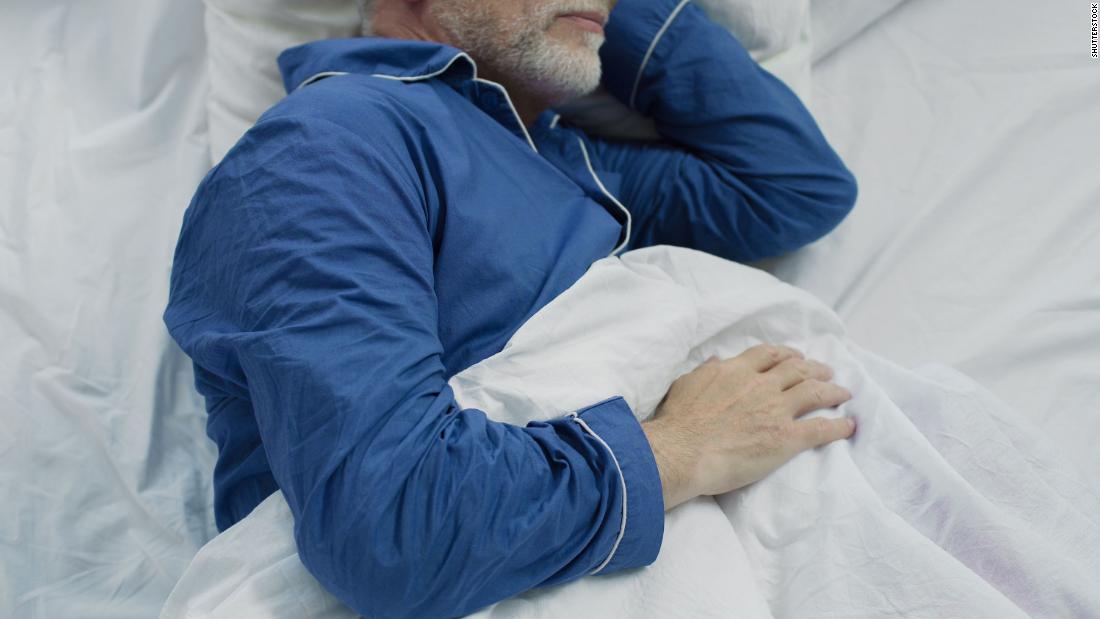How many hours does an adult need to sleep?
0:38
(CNN) -
You know the story of Goldilocks and the three bears, right?
Papa Bear's bed was too hard and Mama Bear's too soft, but Goldilocks found Baby Bear's bed "perfect."
This fable could also apply to the duration of sleep in people as they age.
Like the baby bear, older people who get "just enough" sleep - that is, six to eight hours of quality sleep most nights - appear to delay cognitive decline and keep their brain fit, study finds published this Wednesday in Brain magazine.
"Our study suggests that there is a midrange, or sweet spot, for total sleep time at which cognitive performance remained stable over time," said study co-author Dr. Brendan Lucey, in a release.
Lucey is Associate Professor of Neurology and Section Chief of the Center for Sleep Medicine at Washington University in Saint Louis.
How to fall asleep faster: this is the healthiest way
The study monitored the sleep of 100 older adults who were tested for cognitive decline and for signs of early Alzheimer's disease, and found that only those who slept between six and eight hours were able to maintain their level of function. cerebral.
If a person slept less than five and a half hours, their cognitive performance suffered, even after controlling for factors such as age, gender and Alzheimer's.
This also applied to people at the other end of the sleep spectrum.
If they slept more than seven and a half hours, cognition declined.
How long does it take to recover from lack of sleep?
0:49
"Not only those who slept little, but also those who slept a lot, had greater cognitive decline," said co-author Dr. David Holtzman, scientific director of the Hope Center for Neurological Disorders at the University of Washington School of Medicine. .
advertising
"This suggests that quality of sleep may be the key, as opposed to hours of sleep," he said in a statement.
Aspire to a continuous and quality rest
Adults need at least seven hours of sleep a night, while school-age children need nine to twelve hours and adolescents eight to 10 hours, according to the U.S. Centers for Disease Control and Prevention. CDC).
Older adults often have difficulty sleeping a full seven hours due to chronic illnesses and medications that can cause them to wake up.
But getting a good, good night's sleep is more than just a number.
The quality of sleep you get is also of vital importance.
If you wake up frequently due to noise, sleep apnea or going to the bathroom, you are interrupting your sleep cycle and depriving your body of the restful sleep it needs.
How much do you need to sleep?
It depends on your age
The "sweet spot" for sleep is when you can continuously sleep through all four stages of sleep four to six times each night.
Since each cycle lasts approximately 90 minutes, most people need seven to eight hours of relatively uninterrupted sleep to reach this goal.
In stages one and two, the body begins to slow down.
Heartbeat and breathing slow down, body temperature drops, and eye movements stop.
This prepares you for the next stage: deep slow wave sleep, also known as delta sleep.
This is the time when the brain repairs the body from the wear and tear of the day.
During deep sleep, the body is literally restored at the cellular level.
Little or bad sleep could cause dementia 0:40
Rapid eye movement sleep, called REM, comes next.
It is the stage in which we dream and information and experiences are consolidated and stored in memory.
Studies have shown that a lack of REM sleep can lead to memory deficits and poor cognitive outcomes, as well as heart disease and other chronic diseases and premature death.
Chronic sleep deprivation therefore affects the ability to pay attention, learn new things, be creative, solve problems, and make decisions.
Unfortunately, as people age, they begin to have trouble falling asleep and staying asleep without interruption, which can drastically impact deep sleep and brain function.
Study suggests finding the sweet spot for sleep to protect the brain as we age
A September 2021 study published in the journal JAMA Neurology found that older adults who slept less than six hours a night had more beta-amyloid in the brain than those who slept between seven and eight hours.
Beta-amyloid is a hallmark sign of Alzheimer's disease.
How to improve deep sleep
9 foods that will make you sleep better 1:55
The good news is that it is possible to train the brain to sleep better, thus giving the body more time to dedicate to REM and deep restful sleep.
According to experts, going to bed and waking up at the same time every day, including weekends, is the best advice for getting your brain on track for better sleep.
Next, prepare your sleeping environment and establish a relaxing bedtime routine.
Yoga, a hot shower, a good but not overly exciting book read in dim light ... these are ways to help the body relax into sleep.
REM sleep is a lighter level of sleep that can be more easily interrupted, so try to keep fewer sounds, low light, and cooler temperatures in your room.
Remember: the bed should only be used for sleeping and having sex.
Televisions and other devices that emit blue light, such as smartphones and computers, have nothing to do in your room.
Avoid fatty and spicy foods before bed so gastric upset doesn't wake you up while you sleep.
Alcohol is also prohibited.
You may think that it helps you fall asleep, but you are more likely to wake up at night when your body begins to process the drink, thus interrupting those beneficial phases of sleep.
Sleep quality




/cloudfront-eu-central-1.images.arcpublishing.com/prisa/C4BOJCQJZFGPJORE3TOF2IPXME.jpg)







